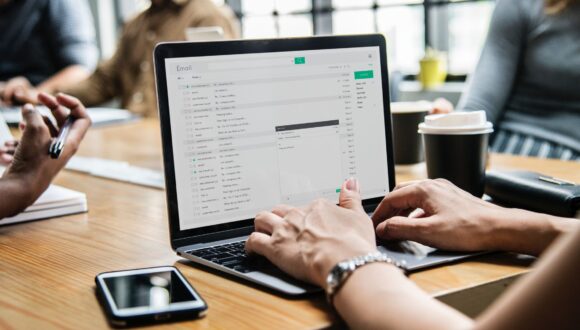The best sellers use tailored sales collateral — both physical and digital materials (such as data sheets, catalogs, social media posts, landing pages, or webinars) developed by their business to support sales representatives and ramp up the entire sales process — to engage potential customers at the right time with the right information, and to help sales reps close deals faster. Today’s most effective sales and marketing collateral bears little resemblance to the jargon-heavy white papers of years past. In fact, modern examples of sales collateral pivot away from the vendor’s perspective and instead incorporate insight from credible third parties. According to Gartner, “content that features a third party telling or validating a story is inherently more credible and trustworthy than the same story told by a vendor.”
ANSWER THESE FOUR QUESTIONS TO DEVELOP EFFECTIVE SALES COLLATERAL
None of this is news for top-performing sales and marketing teams. But as buyers’ expectations evolve alongside rapid technology disruption in every industry, it may be increasingly difficult for sales and marketing to consistently develop on-brand collateral that resonates with new customers and influences revenue. The key to successful sales collateral is to map the content to your buyer’s needs by asking these simple questions:
- Who are we selling to?
- What questions do they need answered and when?
- Who do they trust to answer these questions?
- What types of content will effectively answer their questions?
BUILD THE FOUNDATION FOR SALES COLLATERAL THAT CONNECTS
Answering these questions provides a good knowledge base for reps to create buyer personas. Let’s say your company sells a modern application development automation platform, so software developers and their managers are both prospective customers. Here are the most questions that matter and some answers:
- Motivation (such as, “How can I accelerate release velocity?”)
- Purchase process (ex. Hacker News > open source > free trials > deep-dive demo with sales engineer)
- Influencers (fellow developers, VP of Development)
- Preferred communication styles (Anything but email)
These insights are a critical part of developing sales collateral that connects with your prospects and differentiates you from your competition.
Though acquiring this information may seem daunting at first, the plethora of research on a vast range of buyer types not only helps construct the perfect buyer’s guide but also significantly lowers the barrier for your salespeople to really understand and build trust with potential buyers to help them reach the end of the sales funnel.
DEVELOP SALES COLLATERAL THAT MAPS TO YOUR BUYER’S JOURNEY
Once you have a strong foundation of anecdotal and data-based intelligence, you can confidently develop collateral that aligns to the purchase process, often called the buyer’s journey, so your sales team can answer your prospects’ questions with credible information that matches their current decision-making stage.
To continue our software developer example, it’s unlikely a developer prospect will want a support pricing document when they’ve just begun researching modern development processes. However, they may very well want access to a notable technology analyst’s side-by-side comparison of popular development methodologies. Follow up with your prospect and present them with in-depth pieces of content, along with relevant information that differentiates your platform by showcasing a 300-level demonstration with collateral that details the technology integrations and coding languages your product supports.
Regardless of the stage, it’s critical to map sales collateral to your prospects’ motivations at any given time. SiriusDecisions found that 71% of sales leaders say that their sellers fail to connect their solution to prospects’ needs.
So, just as best practices guidance and credible third-party advice are influential in the early stages of the buyer’s journey (the awareness stage and consideration stage), detailed case studies that align with the prospect’s use case and demonstrate a clear return on investment will be critical in the decision stage to help increase buyer retention.
SALES COLLATERAL ONLY WORKS IF IT’S EASY TO USE
You understand your buyer, their motivations, pain points, influences, and their journey to a purchase. By leveraging credible third-party voices, insightful data, and existing customer testimonials, you can build an extensive repository with various types of sales collateral for different stages of the buyer’s journey. That repository likely includes:
- Third-party research
- Best practice guides
- Sales presentations and PowerPoints
- Customer case studies
- Product demos
- Infographics
- Product overview and in-depth marketing materials
- Email templates
- Explainer videos
- Pricing guides
- Sales scripts
Now that you’re in the last mile to influence revenue with sales collateral, how do you enable sellers to learn about, find, and use this content? How do you track their use and see if they’re aligning collateral to the appropriate buyer’s journey stages? How do you know what is helping with buyer outreach? How do you know what is generating real buyer engagement and what’s falling flat?
Sales enablement technology can answer these questions and offer a comprehensive platform for organizing, using, and analyzing the effectiveness of sales collateral. By providing your sales teams with a single workflow for intuitive sales content management, just-in-time training, efficient communication, and effective sales pitch templates, you’ll maximize the value of sales collateral by shortening the entire sales cycle.
Sales collateral is paramount to buyer engagement. Follow the steps outlined in this blog to build a strong foundation for creating the best sales collateral for your organization, and then explore sales enablement technology to strengthen your sales strategy and turbocharge your sales execution.




